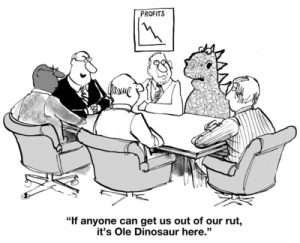Dear Dinosaur Advice Column
Got questions about Robert's Rules of Order? Ann Macfarlane is a dinosaur who knows her stuff. She explains the complexity of Robert's Rules so it makes sense. She loves hearing from readers with their questions about Robert's Rules of Order.
Do we have to accept anonymous comments at our HOA meetings?

© CanStock Photo/andrewgenn
Dear Dinosaur: My homeowner’s association allows for public comments. However, we have members who want to make written comments and keep it anonymous. I don’t think this is right. You need to know who your members are, and they alone are allowed to participate in the proceedings. I don’t see how we could just allow anonymous speeches to be read before a board meeting. What is your advice on what to do with anonymous comments at HOA meetings?
Answer: You are right! A membership organization has to know whether an individual has the right to address it. Unless state law or your bylaws say otherwise, only members of the association have that right. It is fine to require people to identify themselves.
The board can pass a policy to that effect, so everyone understands the situation. On another note, I would refer to this portion of your meeting as “member comments,” not “public comments.”
The situation is very different, of course, with governmental agencies.
Good luck!
Dear Dinosaur provides simple, practical answers to questions about Robert’s Rules and parliamentary procedure. Send your questions to Dear Dinosaur here. Our answers are based on Robert’s Rules of Order, Newly Revised, 12th edition. As always, nothing in this post constitutes legal or business advice. For specific issues, seek a qualified authority.


Although this seems right on the law (and likely the rules), it’s worth thinking about what effect adoption of such a policy would have, and the reason the situation came about. I suspect it may lead to one member rising to say, “I have heard from some friends/members, who I think legitimately fear retaliation, that «… … … … … … …».”
Maybe those kinds of comments are OK. Maybe adopting a policy rightly reduces such relayed comments. But maybe, also, the association should think about why there are fears of retaliation and what it says about the organization and how best to address those underlying issues.
John, the situation you describe, in which a member rises to say “I have heard from fellow members…” should certainly be admissible. And it would indeed be wise for the association to ask itself the questions you raise. Thank you for this thoughtful response to the question and answer.